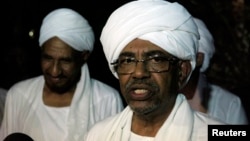The U.S. government says Sudanese President Omar al-Bashir has applied for a U.S. visa to attend the United Nations General Assembly, but says he should not make the trip because he is wanted for war crimes.
State Department spokeswoman Marie Harf declined to comment Monday on whether the visa would be granted but said "we condemn any potential effort" by him to attend the U.N. meeting.
She said before visiting the United Nations in New York, Bashir should present himself to the International Criminal Court [ICC] in the Hague, which has indicted him for war crimes in Sudan's Darfur region.
The U.S. ambassador to the United Nations, Samantha Power, echoed those comments, saying Bashir's proposed trip would be "deplorable, cynical and hugely inappropriate."
Human rights activists have pressured countries not to admit Bashir, and the Sudanese president is careful to visit only nations that are not members of the ICC or have guaranteed his safety.
The ICC accuses Bashir of orchestrating crimes including murder, rape and extermination against civilians in Darfur, where rebel groups have been fighting the Bashir government since 2003. Bashir denies the charges.
Several African countries including Kenya, Chad, and Djibouti have granted entry to Bashir, while others, including South Africa, have refused to let him in.
Last month, Sudan said Saudi Arabia blocked Bashir's plane from entering its airspace as he tried to fly to Iran for the inauguration of President Hassan Rouhani.
In July, the Sudanese president left Nigeria's capital less than 24 hours he arrived for an African Union summit, after activists pressured the government to arrest him.
State Department spokeswoman Marie Harf declined to comment Monday on whether the visa would be granted but said "we condemn any potential effort" by him to attend the U.N. meeting.
She said before visiting the United Nations in New York, Bashir should present himself to the International Criminal Court [ICC] in the Hague, which has indicted him for war crimes in Sudan's Darfur region.
The U.S. ambassador to the United Nations, Samantha Power, echoed those comments, saying Bashir's proposed trip would be "deplorable, cynical and hugely inappropriate."
Human rights activists have pressured countries not to admit Bashir, and the Sudanese president is careful to visit only nations that are not members of the ICC or have guaranteed his safety.
The ICC accuses Bashir of orchestrating crimes including murder, rape and extermination against civilians in Darfur, where rebel groups have been fighting the Bashir government since 2003. Bashir denies the charges.
Several African countries including Kenya, Chad, and Djibouti have granted entry to Bashir, while others, including South Africa, have refused to let him in.
Last month, Sudan said Saudi Arabia blocked Bashir's plane from entering its airspace as he tried to fly to Iran for the inauguration of President Hassan Rouhani.
In July, the Sudanese president left Nigeria's capital less than 24 hours he arrived for an African Union summit, after activists pressured the government to arrest him.





